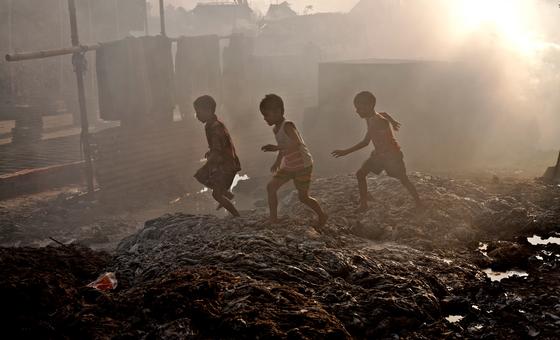Children play in an area outside their home that has been turned into a large dumpsite of waste from leather industries in Dhaka, Bangladesh.
The consequences of poor chemicals and waste management worldwide are fuelling an “unprecedented global toxic emergency”, independent UN human rights experts have warned, ahead of a major summit next week.
The fifth session of the International Conference on Chemicals Management (ICCM-5), organized by UN environment programme UNEP and hosted by Germany, kicks off in Bonn on Monday.
“ICCM-5 is expected to be a watershed moment for international cooperation on chemicals and wastes”, said a statement released by the group of more than 30 experts.
‘Once in a generation’ chance
“It is a once in a generation opportunity to deliver a robust outcome to confront the global toxic tide.”
They urged those attending the conference to be guided by human rights principles in line with a “post-2020 global policy framework on the sound management of chemicals and wastes.”
According to the experts, “the threats of infertility, deadly illnesses, neurological and other disabilities resulting from exposure to hazardous chemicals and wastes, reveal the widespread and systematic denial of basic human rights for countless persons and groups in vulnerable situations.”
The experts went on to list people who are mostly exposed to these toxic environments, including workers, women and children, the poor and Indigenous Peoples.
‘Toxification’ must stop
“Humanity cannot afford to further aggravate the toxification of the planet,” the experts added.
“For ICCM-5 to deliver the ambition and strength needed to overcome the global toxic emergency facing humanity, it needs to explicitly embrace a human rights-based approach,” the group of UN experts warned.
Special Rapporteurs and other UN experts are not UN staff and are independent from any government or organisation. They serve in their individual capacity and receive no salary for their work.

